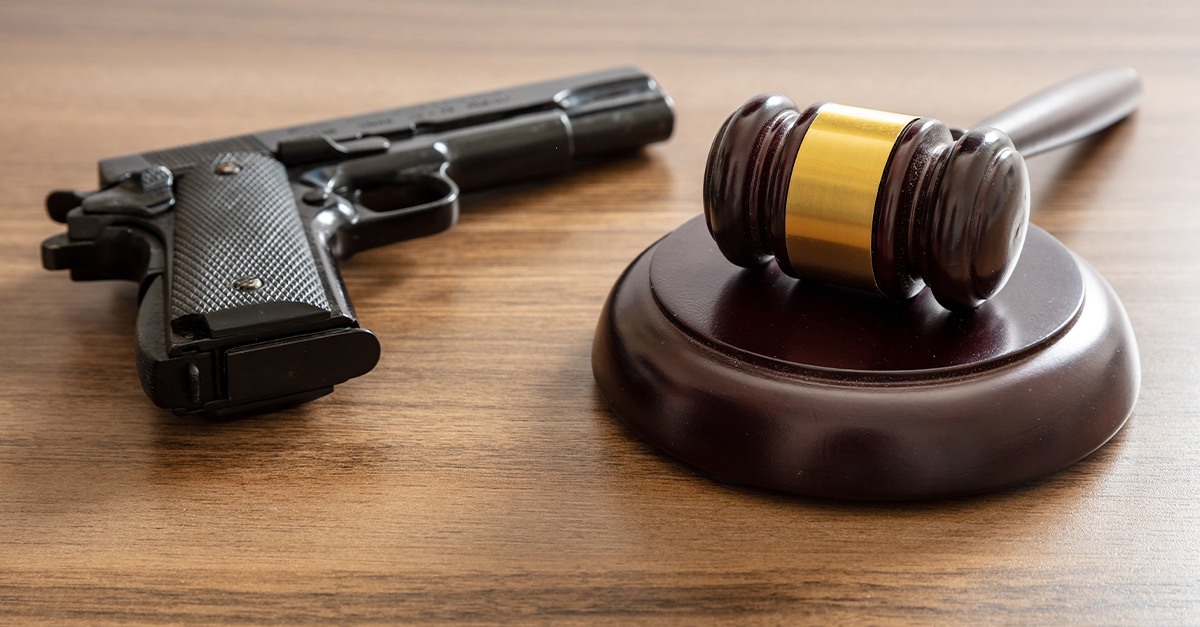


Get a free copy of Parental Rights & Education when you subscribe to our newsletter!

As states continue to flout the Supreme Court’s Bruen ruling with new gun control efforts, federal judges are upholding the rule of law by acting as a proper check and balance.
The U.S. Court of Appeals for the Ninth Circuit has reinstated an injunction blocking California’s ban on carrying guns as the court will hear the case in April.
In the wake of the Supreme Court’s ruling in New York State Pistol and Rifle Assn v. Bruen in which the Court made clear that “the Second Amendment is not a second-class right,” the battle over gun rights has not lessened. In this landmark ruling, the justices struck down New York’s permitting scheme that forced applicants to prove they needed to carry a gun and then arbitrarily approved or denied their application.
Despite the Court’s clear ruling that affirmed the right of Americans to carry a gun for self-defense, states have defiantly sought other ways to deny gun owners that choice. Perhaps the most common has been through “sensitive place” restrictions. The laws, passed by states like New York, New Jersey, Hawaii, Maryland, and California, stretch the Court’s narrow allowance for laws that restrict guns in “sensitive places.” While the Court intended these laws to be restricted to a limited number of locations in which there was a historical tradition of restriction, states have impetuously sought to define virtually every place outside of an individual’s private home as a “sensitive place.”
California’s law does just that. Senate Bill 2 restricts the right of even those who have received a concealed carry permit to carry a firearm in 26 different categories of locations, including schools, churches, parks, public property, public gatherings, anywhere that alcohol is sold, and any private property that does not have a sign explicitly stating that guns are allowed.
The law even bans having guns in the parking lots of any of these locations, meaning concealed carry holders are unable to store their guns in their cars while visiting any of these places.
Several gun owners and gun rights organizations filed suit challenging the law, and on December 20, U.S. District Court Judge Cormac Carney issued an injunction stopping it from being enforced. Carney articulated that the Founding Fathers had recognized the right to defend oneself and their family by codifying the Second Amendment. Further, the Supreme Court had explicitly ruled that regulation that took away that right is not permitted. He wrote:
“Some disagree with the Founders and the Supreme Court that individual citizens have a right to protect themselves and believe that the best solution to the many dangers of the modern day is to prevent law-abiding citizens from carrying handguns. It is not this Court’s place to question their judgement as to how to solve the many challenges we face. That is up to the people and their elected representatives. But the Constitution, by design, recognizes that some rights are so important and sacrosanct that nothing short of a constitutional amendment may take them away. No one—not a federal judge, not a state governor or legislator, not even the President of the United States—is above the Constitution.”
He then chastised California lawmakers, writing, “Nevertheless, California recently passed a law, Senate Bill 2, that limits the public places where people with concealed carry permits may carry their handguns to defend themselves and their families…SB2’s coverage is sweeping, repugnant to the Second Amendment, and openly defiant of the Supreme Court.”
He continued, “SB2 turns nearly every public place in California into a ‘sensitive place,’ effectively abolishing the Second Amendment rights of law-abiding and exceptionally qualified citizens to be armed and to defend themselves in public.”
Ten days later, a panel of the U.S. Court of Appeals for the Ninth Circuit stayed the injunction, allowing the state to enforce the law.
C.D. Michel, attorney for the plaintiffs, retorted that the Ninth Circuit had deviated from the status quo by permitting the law to be enforced even as a hearing awaited, even pointing out that the Ninth Circuit deviated from its own precedent when it chose to keep in place injunction against Hawaii’s very similar law. He noted that
“Hawaii’s post-Bruen carry restrictions on newly-designated sensitive places remain unenforceable pending appeal, while California’s post-Bruen carry restrictions on newly-designated sensitive places are inexplicably enforceable pending appeal. The reasons for these differing outcomes and interpretations of what would preserve the status quo for one state’s citizens but not the other’s are not readily apparent, and seem to be logically irreconcilable.”
Whether the Ninth Circuit heard Michel’s criticisms or not, it suddenly decided on January 6 to rescind the stay of the injunction, meaning that the law cannot be enforced until its merits are considered in court.
Michel reacted to the stay by saying,
“Had this new law taken effect, it would reverse decades of allowing vetted and licensed [concealed-carry weapon] holders (but not the general public) to carry in places where the need for self-defense can be most acute. So the politicians’ ploy to get around the 2nd Amendment has been stopped for now. Now we will focus on stopping it for good.”

The Ninth Circuit’s decision to ultimately block this law for the time being shouldn’t imply that they will rule in the gun owners’ favor when the case is finally heard. This appellate court has a penchant for siding with gun control measures (which is why California already has some of the most stringent gun control measures in the country), and the fact that the panel already lifted the injunction once could serve as an indicator of its leanings in this case.
Still, most federal judges have already struck down these blatantly unconstitutional ploys at eliminating the right to carry a firearm. In these rulings, federal judges have demonstrated their near shock at the brazen usurpation of the Constitution and the Supreme Court’s ruling. In the case of New York, Judge John Sinatra Jr. quipped, “The Constitution and the Bill of Rights are the Status quo — not 2022 legislation on the books for nine weeks. Legislative enactments may not eviscerate the Bill of Rights. Every day they do is one too many.”
California already has severe gun control for most of its citizens, leaving them vulnerable to crime and those carrying illegal firearms, but the new law extends it to concealed carry holders—who are considered especially responsible and law-abiding. These gun owners already have to go through extensive background checks and training under the law to get a permit but under this law, but under this new law they can carry their guns almost nowhere in public. The result is a convoluted, back-door infringement on the Second Amendment’s inalienable right to self-defense, a right fully affirmed by both the Bruen and Heller decisions.
The executive and legislative branches of these state governments know they are defying the Supreme Court’s rulings. And yet they arrogantly flout the Constitution and seek to go even further in their attempts to take away gun rights. When one house of government exceeds its powers, it is essential that the other branches check their power. That is what these judges are doing — fulfilling their duty to uphold the rule of law. Hopefully, they will have the strength and integrity to continue to do so even as more states push to increase gun control rather than protect the constitutional rights of their constituents.
If you like this article and other content that helps you apply a biblical worldview to today’s politics and culture, consider making a donation here.
